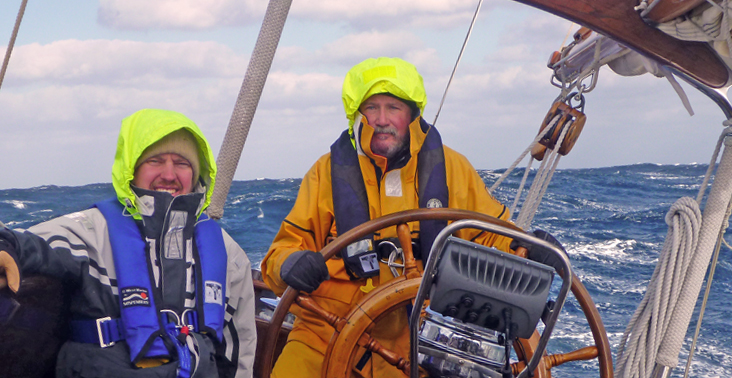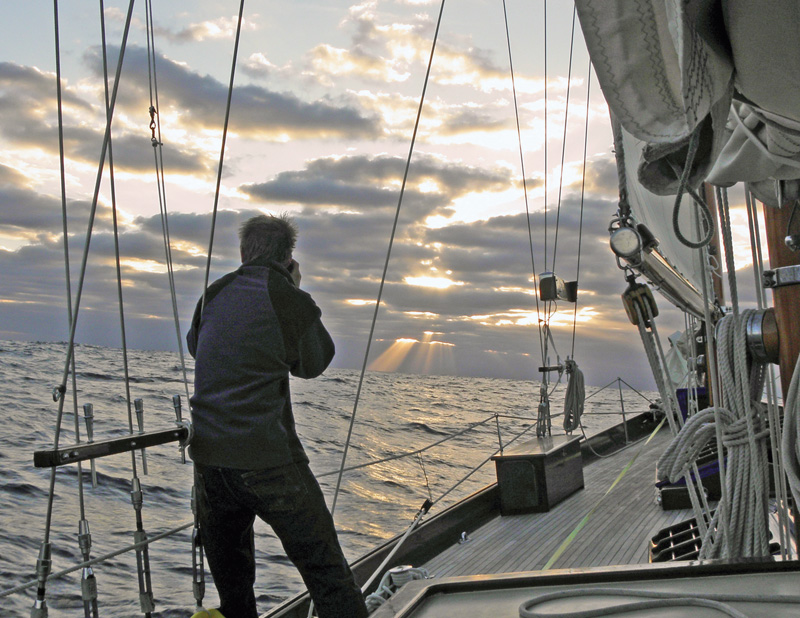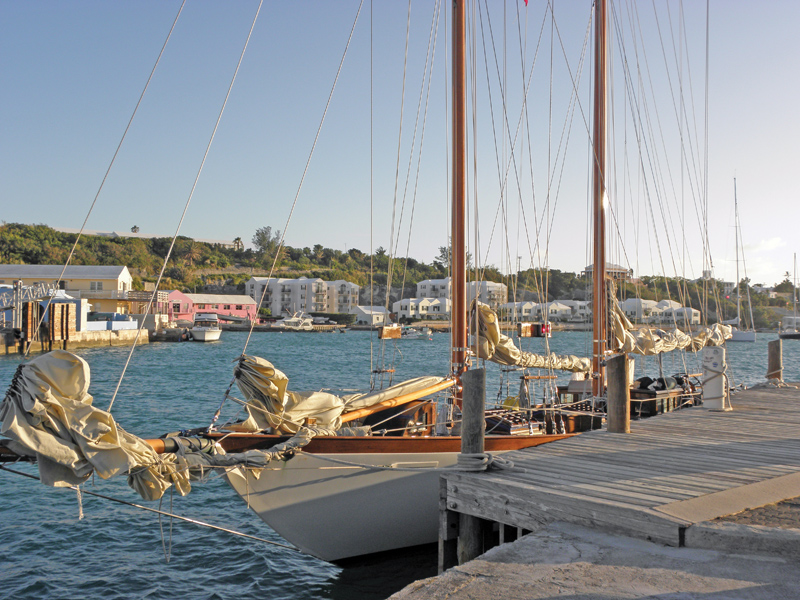My memorable moment: a windy midnight passage sailing to Bermuda
Every sailor, I believe, when asked, can immediately recall the singular most memorable event in their sailing experience or the most serene moment that surpasses all others, something of a zenith, ultima thule, or stand-out time and place that not only dwarfs all others, but which represents the summary and pinnacle of all one’s sailing experience condensed into a single recollection. For me, it was a windy midnight passage across a sea of wild horses, under a full moon, sailing an antique classic schooner through the night on my first visit to Bermuda.

It was late November when we left the dock in Newport, RI, in cold and windy weather, heading south toward the British Virgin Islands, our destination the island of Tortola. We were sailing the 1926 Herreshoff staysail schooner Mary Rose on a delivery trip for the owner, who planned to keep her down there over the winter and race her in the Antigua Classic Yacht Regatta in April of the following year. Mary Rose is more than 80 feet long, sparred, and sails so smoothly, and is so finger-touch responsive to her helm, that she seems to be a Cadillac among sailing craft, in fair weather or foul.
A rough ride
But we had a rough ride for the first couple of days and a cold one at that. The two other crewmen were queasy, the boat wet and cold. We dreaded standing helm watch out on the open and unprotected deck. We finished our watches exhausted and hung up our wet clothes and foul weather gear, only to put it back on again a few hours later. After the second day of making southward progress, the air seemed to grow milder, and when splashed by seas breaking over the bow or rail, the water seemed to grow ever so slightly warmer.
One crewman, an older gentleman who was not used to the sea, became very seasick and did not stray from his cabin except to vomit in the head, a claustrophobic little box directly across the corridor from his door, which he kept closed. We stood his watches for him, stressing all of us, and by the end of the fourth day, Captain Tom shook his head and said, “We’re diverting. We’re going to Bermuda. The last thing I want is to pull into Tortola with a corpse in that cabin.” So, we changed our course to head more easterly. We would offload our sick crewman in Bermuda, and he could recover and take a commercial flight home.
My late friend Bruce sailed to the Caribbean many times as a young man, sailing with the legendary Don Street. “Oh, I remember it well,” he would say. “November cold, giving way to mild temperatures after a few days of southing.”
Indeed, the first couple of nights, standing watch in rough seas, were difficult yet filled with wonder. Standing alone and cold at the wheel, the world around me was wet, noisy, roiling, and pitch-dark but for the brilliant dome of the stars overhead. The dark silhouette of the mast swung from side to side in the rolling seas, and I did my best to keep the mast lined up with the singular bright Dog Star dead ahead, my guide through the seemingly endless hours of my lonely watch. The cold, dark night was mystical; sleek black silhouettes of dolphins leaped through the waves nearby, keeping pace with us for hours, reflecting the moonlight while the baleful eye of the lighthouse on the cliffs of Aquinnah winked in the distance.
The night before landfall in Bermuda, the wind piped up out of the southwest to 30 knots, so there was much work to do. I donned my harness and clipped on. Two crewmen came up on deck and took in a double reef in the main and double reef also in the mizzen, furled the jib, and just left up the staysail. We wanted to slow her down a little bit so that we would not reach the island under cover of darkness, which, according to our calculations, we actually would at our current speed. The boat also behaved better when not over-pressed; she was happier and more buoyant in the lumpy seas.
In the cockpit, steering, I was wide awake, and excited. Mary Rose was slicing across the seas on a close reach, and I felt greater confidence now because we were headed for landfall in a few hours. All of the anxieties of the past few days were beginning to ease as my mind focused on only one goal; reaching Bermuda. I was weary; a wintry voyage like this, with its attendant sleep deprivation at times, quick and often inadequate meals, and physical demands all take a toll.

The moonrise
Seated in the cockpit by the wheel, wrapped in my sou’wester, with my back to the wind on a starboard tack, I watched the moon rise over the eastern horizon, cheerfully illuminating the rolling seas with a soft, silken glow reminiscent of a dreamy, romantically wild 19th-Century oil painting of a seascape at night. Beethoven’s “Moonlight Sonata” came to mind. But this was no still-life. This was very much a world in motion. I began to lean with the roll of the boat, in synchrony with the seas. The motion was suggestive of the art of riding a horse; the boat moved in long and gentle, steady, measurable leaps without pause, driving onward always. Odd, I thought to myself, how wonderful and memorable this particular moment is, this stretch of a few hours of sailing so gloriously along out here in the middle of a trackless ocean. Every so often, a sea would break against the bow, sending a splash of warm, dark spray flying aft to the cockpit; when it struck my face, it tasted clean and briny. I thought of the rest of the world’s citizens comfortable in their motionless beds ashore, but I did not envy them tonight.
My serenity was tempered by the recently gained knowledge that another 40-knot gale was brewing and would be fully upon us by the following morning, according to what snippets of weather forecasting I had been able to glean from broken transmissions on the radio. This created some anxiety for me since I did not want to be in another stiff gale so soon.
Another gale to come
I had begun to pick out scratchy, static-punctuated weather forecasts from Bermuda Radio. The prediction was for the gale to blow out of the southwest. It was already blowing out of that direction and at nearly 30 knots at that and was growing stronger by the hour. Since we were approaching Bermuda from the northwest and coming around to the northeastern side, we could anticipate finding relief by being in the lee of the island, where we could stand off in relatively sheltered waters until dawn. We could then motor into St. George’s harbor through the passage known as Town Cut.
The approach to Bermuda is complicated by the fact that the island of Bermuda itself, which is not really a single island but a collection of many small islands, all in close proximity, is surrounded by a perimeter of deadly coral reefs and shallows extending some 10 miles out from the actual shoreline. The only safe and reliable route into sheltered St. George’s is from the northeast side of the island. No other approach from any direction is safe or feasible due to the deadly encircling ring of reefs 10 miles out.
The island of Bermuda does not really provide a very effective lee since the land overall is so low. Without mountain peaks or anything of the sort to impede the blast, the wind literally howls over the little archipelago as though it’s hardly there. Couple that with the fact that one must stay well offshore, in the darkness, to stay prudently outside of the deadly reefs, and one might as well be out on the open sea, for all the shelter that its lee is worth.
Distances at sea can be deceiving, especially at night. For a few hours now, I had been able to see the very faint, unnatural glow of Bermuda against the cloud ceiling in the distance. It was colorless and barely discernible, yet still visible against the murky darkness all around. When I thought we were closer, we were actually still many miles distant, even too many miles for clear or practical VHF radio contact. Over the next few hours that glow of the island still over the horizon would grow brighter and larger, eventually punctuated by the flashes of light tower beacons at the edge of the ring of reefs illuminating the undersides of the clouds. Although the actual lights were still just over the horizon, the comfort that even that faint glow, no matter how distant, imparts to the mind, is powerful. It gives new-found strength and energy and fosters a change of mind-set and perspective.
As we drew closer, I heard the weather broadcast from Bermuda Radio coming through with increasing clarity. It was a live broadcast, it seemed, even though it was broadcast during the middle of the night, delivered by a pleasant, professional radio operator, a fellow with a British, if suspiciously New Zealand, accent. Hungry for human contact, and thinking, mistakenly, that my transmission might be heard as clearly by that operator on a hilltop as I could hear his, I tried to call him on the VHF, because the weather forecast transmission had been spotty and broken up, but the words “40-knot gales” had been quite discernible. I queried him about the forecast and asked him to repeat it.

A kind voice in the night
He came back to me by saying that I was still too far away for him to make out our transmission, and that we should contact the station again in a few hours when we were closer to the island; but he had heard me ask for a repeat of the marine weather forecast, and although he did not say so over the air, I believe that he detected some anxiety in my voice, and as a result, he quite remarkably, and patiently, repeated the forecast, speaking slowly and distinctly, a kindness and professional courtesy that I had not anticipated, a voice far more reassuring since it was a live human voice rather than an automated robot transmission. It was real contact, and it cheered me, even though that cheer was tempered by the validation of my concern that we would be in the heart of another gale in only a few hours, possibly before we would be within the safety of the harbor. But there was no other option than to make all possible speed directly toward the island.
After what seemed an interminable night of endless tumult, we saw the welcome glow of the gray dawn in the east. It cheered me. My pulse quickened, and I felt excitement like that of a child as my heart beat in anticipation of landfall and the relief of quiet waters. At long last, we were headed in, under a high dawn, broken clouds of a mottled mackerel sky, beautiful as the wind now began to pick up in earnest, the air fresh, warm, and moist. A high dawn at sea is a time of peace, contemplation, and joy, even though it is usually a harbinger of strong wind later. Out of the dusty recesses of my mind came, inexplicably, a fragment of an old rhyme that brought a faint smile: “The evening red and morning gray/ Are sure signs of a fine day.”
It was blowing half a gale when we motored around the channel markers and into narrow Town Cut, a channel blasted through a limestone cliff, and emerged into the strange calm of the inner harbor. We tied up at the customs dock just after sunrise, a golden-orange groggy, damp, fatigued sunrise, my mind dulled by lack of sleep. Sights and sounds were coming to me as through a frosted lens, fuzzy and dark around the edges. Scrubby trees like windswept evergreens hung on tenaciously to the rocky ledges around the harbor entrance and for the first time I realized that the strange sweet scent reaching my nostrils was the smell of land. A solitary palm tree stood on the crest of a hill across the harbor. We had arrived!
by Capt. Michael L. Martel




